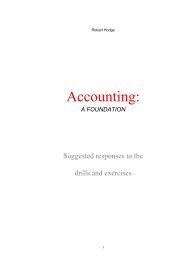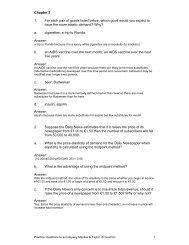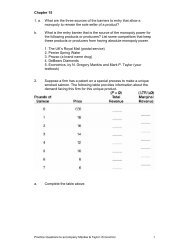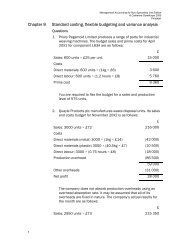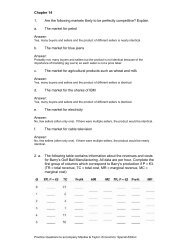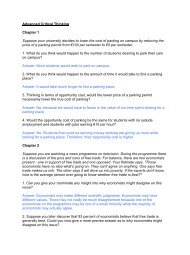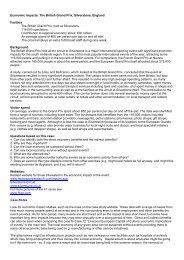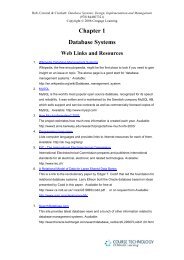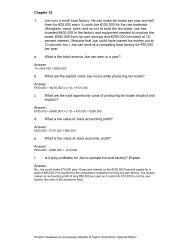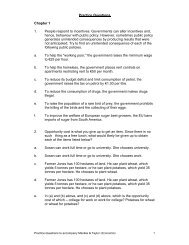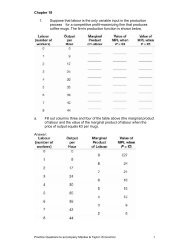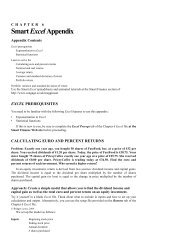CHAPTER Recruiting and selecting staff for international assignments
CHAPTER Recruiting and selecting staff for international assignments
CHAPTER Recruiting and selecting staff for international assignments
- No tags were found...
You also want an ePaper? Increase the reach of your titles
YUMPU automatically turns print PDFs into web optimized ePapers that Google loves.
31017_05_Ch05_p109-136.qxd 9/7/07 12:15 PM Page 118118 <strong>CHAPTER</strong> 5 RECRUITING AND SELECTING STAFFDespite these limitations, however, expatriates often relate experiencing thesephases, <strong>and</strong> awareness of the psychological adjustment process can assist theexpatriate adopt positive coping behaviors. We should also note that family membersexperience the phases differently, <strong>and</strong> not necessarily move through the variousphases at the same time as each other. How accompanying family membersh<strong>and</strong>le cultural adjustment is important, as there can be a spill-over effect – anunhappy spouse may affect the expatriate’s ability to adjust, <strong>and</strong> thus impact onper<strong>for</strong>mance. For example, in their study of US managers in Japan, Korea, Taiwan<strong>and</strong> Hong Kong, Black <strong>and</strong> Stephens 25 found a high correlation between spouse<strong>and</strong> expatriate adjustment. Companies can assist in the cultural adjustment of theexpatriate <strong>and</strong> employee by using volunteer employees who have worked abroadas expatriates to ‘adopt’ a visiting family <strong>and</strong> assist in their adjustment.Length of assignmentThere is some evidence that length of assignment does contribute to adjustment<strong>and</strong> per<strong>for</strong>mance. For example, the average assignment <strong>for</strong> Japanese firms tends tobe four to five years, compared with the figure shown in Table 5.1 of 1–3 years <strong>for</strong>53 per cent of the sample of the GMAC 2005 survey. A longer assignment allowsthe expatriate more time to adjust to the <strong>for</strong>eign situation <strong>and</strong> become productive.26 Japanese firms often do not expect the expatriate to per<strong>for</strong>m up to full capacityuntil the third year; the first year of the <strong>for</strong>eign assignment is seen mainly asa period of adjustment to the <strong>for</strong>eign environment.Willingness to moveIn a situation where an employee is a reluctant expatriate or accompanied by reluctantfamily members, it is more likely that they may interpret negatively events<strong>and</strong> situations encountered in the new environment. In their survey of 405 USmanagers <strong>and</strong> their spouse/partners, Brett <strong>and</strong> Stroh 27 found a significant causalrelationship between the manager <strong>and</strong> the spouse’s willingness to move. Theyconclude that managers who are most ready <strong>for</strong> <strong>international</strong> relocations are thosewhose spouses are also supportive of that move – a not surprising finding. Otherstudies support the importance of a positive outlook. For example, Hamill 28reported that the reasons <strong>for</strong> lower British expatriate failure rates were that Britishmanagers were more <strong>international</strong>ly mobile than US managers, <strong>and</strong> that perhapsBritish companies had developed more effective expatriate policies. Dowling<strong>and</strong> Welch 29 note that the respondents in their research perceived an expatriateposting as a desirable appointment – an opportunity to travel <strong>and</strong> live overseas –leading to a positive outlook on the <strong>for</strong>eign assignment. Willingness to relocate asa predictor of success should include the views of family members <strong>and</strong> is alsoassociated with the perceived desirability of the location of the <strong>international</strong>assignment.Work environment-related factorsGregersen <strong>and</strong> Black 30 studied 220 American expatriates in four Pacific Rim countries.They found a positive correlation between what they term ‘intent to stay inthe overseas assignment’ <strong>and</strong> the PCN’s commitment to the local company,adjustment to interaction with HCNs, <strong>and</strong> adjustment to general living conditions.Adjustment to the work role itself however, was negatively associated with ‘intent



